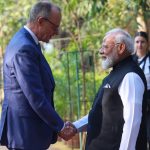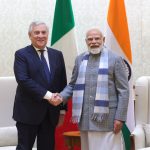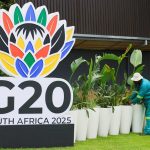As published on

The old debate about the divide between G7 bloc and the Global South countries in the G20 has been revived, with consensus proving to be elusive. Divisive issues such as the Russia-Ukraine war are threatening to hijack the core mandate of the G20 as the world’s premier multilateral forum for management and stability of the global economy. Going against the grain, the US, the world’s most powerful economy and hegemon, has played the spoiler relentlessly, obstructing joint statements at the meetings held in the run-up to the summit. With the US boycotting the summit, it’s not clear who will President Ramaphosa pass on the G20 gavel at the end of the summit, symbolising the wilful diminishing of the G20 grouping.
The overarching theme of South Africa’s G20 presidency is “Solidarity, Equality, Sustainability,” with the focus on interlinked issues, including bridging global inequality, debt crisis of African countries, inclusive growth, climate finance, and critical minerals for inclusive growth. Addressing these issues requires the G20 to speak in one voice and act in the spirit of unity and ubuntu, but competitive geopolitics has obstructed consensus. South Africa’s President Ramaphosa voiced his despair at “boycott politics.” “There is a lack of consensus among major powers, including in the G20, on how to respond to these issues,” he said. South Africa’s President Cyril Ramaphosa has asserted that Pretoria will not be deterred by boycott politics and stressed that the Johannesburg summit will be a success regardless of Washington’s grandstanding. The US’ boycott has, however, reduced the possibility of a joint G20 Declaration. Under the circumstances, the Chair’s summary looks a more realistic possibility. This should, however, not detract from the success of the summit as a majority of G20 nations are aligned with South Africa on core priorities and outcomes, including the African agenda.
Reasserting Global South solidarity
It’s important to remember that the Johannesburg summit is taking place at a time of enormous turbulence in the international arena, triggered by geopolitical conflicts and crises. In a deeply polarized world, four Ps dominate international discourse – poly-crisis, paranoia, polarisation and perplexity. Against this backdrop, the Global South countries, especially India and South Africa, will have to cooperate and coordinate proactively to rescue the G20 from internal divisions by bringing together developed and developed countries on major global issues.
Prime Minister Narendra Modi will be among world leaders who will participate in the Johannesburg summit. Given India’s robust bilateral relations with South Africa, PM Modi has pledged full support for core priorities of Pretoria’s G20 presidency and will work proactively with President Ramaphosa for the success of the summit. The core priorities of South Africa’s G20 presidency are extension and amplification of India’s G20 presidency and are animated by the ethos of “vasudhaiva kutumbakam” – “One Earth, One Family, One Future” and African philosophy of ubuntu, which emphasizes interconnectedness and collective action. India will support Pretoria’s focus on strengthening disaster resilience and response, which builds upon the Disaster Risk Reduction Working Group that New Delhi India launched during its presidency. PM Modi is expected to pledge India’s full support to South Africa’s key goal for devising a new model for debt sustainability for low-income countries. India will also call for raising the ambition for climate action and mobilizing finance for just energy transitions. PM Modi is expected to share how India raised the bar for climate finance. In this context, PM Modi PM Modi is likely to expose the West’s double standards on energy access – a veiled critique of the US pressure on India to reduce oil imports from Russia. He is expected to focus on protecting interests of the Global South in terms of energy, food and fertilizer security in a volatile geopolitical climate.
The Road Ahead
Looking beyond the Johannesburg summit, India, along with like-minded fellow-travellers in the Global South – South Africa, Brazil and Indonesia — should work proactively to ensure that the interests and aspirations of the Global South are not compromised and sidelined in the next wave of G20 presidencies, which will be dominated by the Global North. The four consecutive G20 presidencies of India, Indonesia, Brazil, and South Africa, successfully mainstreamed the priorities of the Global South in the G20 agenda. However, with the US taking over the G20 presidency from December 1, 2025, there are serious doubts about whether the Global South will enjoy the primacy as Washington has major reservations about key elements of the Global South agenda, including climate action and WTO reforms.
Both India and South Africa share the vision of an inclusive G20 in which the North and South are not locked in rivalry, but act in unison to address global crises and challenges in the spirit of consensus-based multilateralism. At a panel discussion in New Delhi, organised by Centre for Global India Insights, a think tank focused on global affairs, South Africa’s High Commissioner to India Anil Sooklal said that the G20 works together as a collective, and underlined that working in isolation, neither the Global North nor the Global South can resolve the world’s problems. “The G20 proves that the Global North and the Global South can work together, addressing collective issues,” he said. With the world riven by poly-crisis, aggressive unilateralism and the UN in decline, the G20 can’t afford narrow group politics. India’s G20 mantra of “One Earth, One Family, One Future” One World,” One Future and the African ethos of ubuntu should dovetail into a shared vision that can guide the G20 in sculpting a more inclusive and empowering international order
Author Profile

- Manish Chand
- Manish Chand is Founder and Editor-in-Chief of India Writes Network (www.indiawrites.org) and India and World, a pioneering magazine focused on international affairs. He is CEO, Centre for Global India Insights, an India-based think tank focused on global affairs.
Latest entries
 India and the WorldJanuary 13, 2026India, Germany raise the bar for defence, economic ties
India and the WorldJanuary 13, 2026India, Germany raise the bar for defence, economic ties India and the WorldDecember 12, 2025India-Italy bonding: Tajani’s visit raises the bar for business, maritime ties
India and the WorldDecember 12, 2025India-Italy bonding: Tajani’s visit raises the bar for business, maritime ties In ConversationNovember 26, 2025G20 is a Force for global Good
In ConversationNovember 26, 2025G20 is a Force for global Good articlesNovember 26, 2025Rescuing G20 from North-South divide: Ubuntu Moment
articlesNovember 26, 2025Rescuing G20 from North-South divide: Ubuntu Moment




